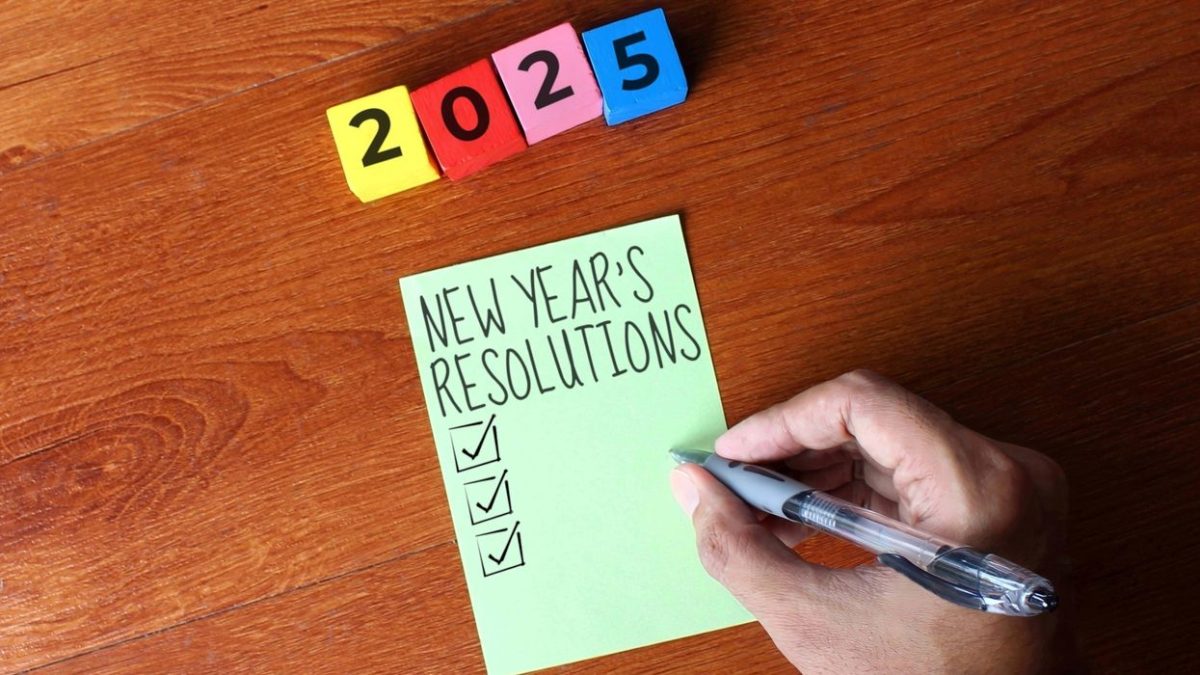On Jan. 1, the gym is packed with fresh starts and new goals, an environment full of possibility, determination and untouched planners. From losing weight to saving money, the new year is a moment to reset and embrace a transformation through a resolution. However, by February, the gym equipment becomes less crowded as more and more canceled memberships roll in, the planner remains closed, and ambitious goals set before the new year seem so far, with only 9% of Americans actually completing their New Year’s resolutions. Additionally, according to the Fisher College of Business, 23% of people abandon their resolution by the first week and 43% by the end of January. In addition, according to Glofox, gym memberships peak in January, with 50% of their members quitting within six months.
It is a familiar cycle of setting lofty resolutions, convinced that this year will be different, yet by mid-year, they tend to slip away. This may leave many people to question why New Year’s resolutions fail so often.
“Falling back into old habits after a few weeks of effort is a natural part of the human experience,” Chas Doerror, AP Psychology teacher, football and track and field coach, said. “Habits are deeply ingrained patterns that the brain associates with comfort and efficiency. When faced with difficulty or frustration, people often revert to these automatic behaviors because they require less effort and decision-making.”
One contributing factor to why many people have difficulty succeeding in their goals is that they underestimate the work or difficulty of accomplishing their goals.
“Old habits are hard to break, and you have to really make an effort to change,” Jennifer Ryan, ASB, Leadership and English 9 teacher, said. “It takes a lot of work and focus, and that’s really hard for people to do so they forget about their New Year’s resolutions. I think people are capable of keeping them, but it takes more work than they anticipated.”
The tendency to fall short of expectations is not as simple as a matter of willpower. While initial motivation may be high, it often is not enough to sustain the effort when faced with setbacks or a lack of immediate gratification.
“We want instant gratification and instant change, so the psychological trap is all of a sudden I have a goal, but I do not have a plan,” Angela Willden, PALs adviser, AP Chemistry and Honors Chemistry teacher, said.
“This is a common cognitive distortion where people see success or failure in extremes, thinking that if they don’t stick to their resolution perfectly, they’ve failed entirely,” Doerrer said. “For instance, if someone resolves to stop smoking and has a single slip-up, they might think they’ve failed completely, leading them to frustration and ultimately abandoning their goals. This discourages incremental progress and often leads to giving up after a mistake.”
Given the desire for perfection or unrealistic expectations, some approaches to goal setting will undoubtedly lead to failure, which leads to the question of how one can break the cycle and set oneself up for success.
“You can’t make massive changes overnight, we aren’t capable of doing that,” Willden said. “All we can do is make little incremental changes daily. Those accumulate over time to result in massive change. But New Year’s resolutions are like ‘I’m not going to do anything different other than to set that goal.’”
To avoid falling into this cycle, it is important to approach goal setting with a strategy that accounts for setbacks and celebrates progress along the way.
“Setting goals that are challenging but still realistic increases the likelihood of success,” Doerrer said. “If the resolution is too ambitious such as ‘I will run a marathon next month’ without prior training, it may feel overwhelming, leading to burnout. Breaking larger goals into smaller, manageable steps like ‘I will run for 10 minutes daily this week’ keeps motivation high and progress measurable. Understand that failure is an inherent part of growth. Rather than seeing it as a negative outcome, view failure as a valuable opportunity to learn and adjust your approach. After a setback, instead of ruminating on the negative emotions, ask yourself what you can take away from the experience.”
To create progress, the focus should be on creating a system, rather than merely setting goals because they are more sustainable and allow for continuous improvement.
“What we really need to do is change our system, and change what we do everyday and make little changes overtime,” Willden said. “I think you don’t make a resolution. It is like a goal, and once you reach that goal you stop doing whatever it was that lets you reach the goal, so even if you reach your goal you are going to slip back. Instead of setting goals, create a system or plan in which you want that goal to operate. By changing your system, you can do lots of things.”
Many barriers can set someone back from achieving their goals, such as technological devices.
“I would say my biggest barrier for me in sticking to my resolutions is my phone, because I often find myself doom-scrolling on my phone on social media, which causes me to lose time that I could be working towards my goals,” Baylin Tsai (10), president of TPHS Psychology Club, said.
In contrast, Tsai has also found strategies to make her electronic devices help her accomplish her goals.
“To make my goals more sustainable, I would pair my goal with a habit I already have,” Tsai said. “For example, if my goal was to plank for two minutes every single day, I would do my plank while listening to a song that is around 2 minutes long. Because I listen to music every day, I would soon make planking a habit.”
While these systems help create lasting progress, resolutions should be meaningful to an individual to increase the likelihood of success.
“We feel pressure to set them because people ask us, and it comes up in conversation or social media,” Willden said. “But if it’s not meaningful, long-lasting or personal, like if you’re setting the same goals your friends are setting, it’s not valuable to you.”
In society, people feel pressured to set goals as it has become a norm, but goal-setting should be self-driven to have higher motivation to work towards that goal.
“My personal desire to change usually inspires me to set resolutions at the start of a new year,” Tsai said. “I actually do not feel pressure from social expectations to have resolutions, and I have a strong desire to better myself, and I usually use the new year as a way to motivate myself to do so.”
When it comes to personal growth, it is easy to get fixated on perfection, but it is important to remember that perfection is not the goal and is impossible to achieve right away or in a short amount of time.
“A lot of the things I do are specific and intentional, so my resolutions are the same way,” Emilia Biebel (11), a member of PALs said. “For example, I said on these days of the week I’ll wake up at five a.m. and work out, and maybe I’ll get two out of three days, but I feel like I’m achieving it to some extent and doing well so far. Even though I’m not at a 100% success rate, I’m starting to build good habits. It’s also unfair to expect yourself to adapt to a whole new lifestyle.”
Biebel also advises on how to approach goal setting in a way that leads to lasting change.
“Being really specific and intentional about goals is the best way to make sure you are consistent with your goals,” Biebel said. “But also be gentle with yourself and it’s impossible to be perfect, so if you are hitting the majority it’s a success in my opinion. Make sure it’s not a crazy change like I already get up early, so it was not a big change for me, so don’t change something polar opposite of the habits you already have and focus on consistency.”
Shifting to a more flexible mindset can reduce the pressure often tied to ambitious goals, and is key to long-term success.
“Focus on progress, not perfection,” Doerrer said. “Celebrate your efforts and small victories along the way. This mindset allows for more flexibility and less pressure, making self-improvement feel more achievable and sustainable. By focusing on these sustainable approaches, you can continue to evolve and improve throughout the year without the pressure or stress that often accompanies rigid resolutions.”









